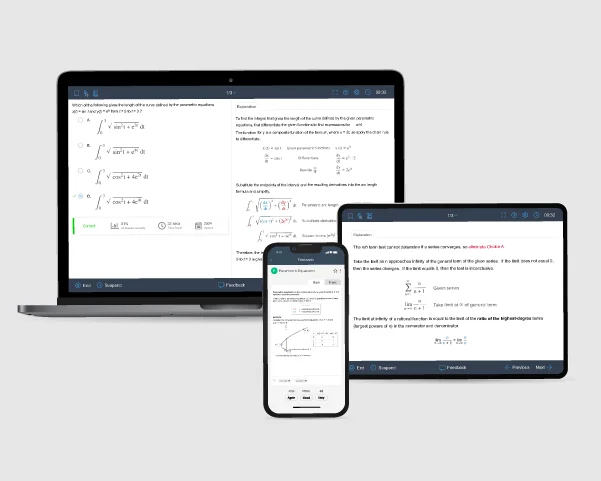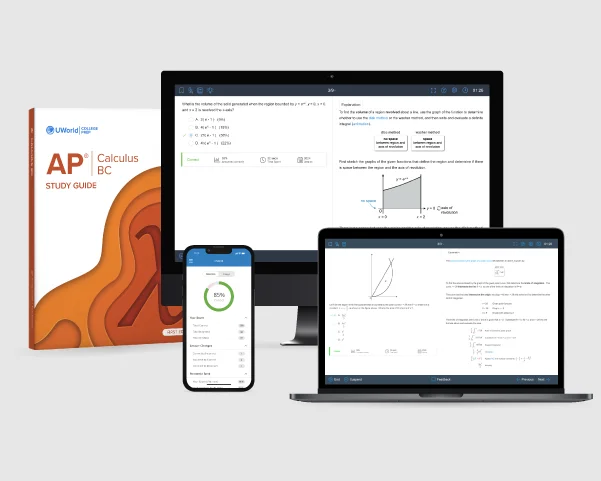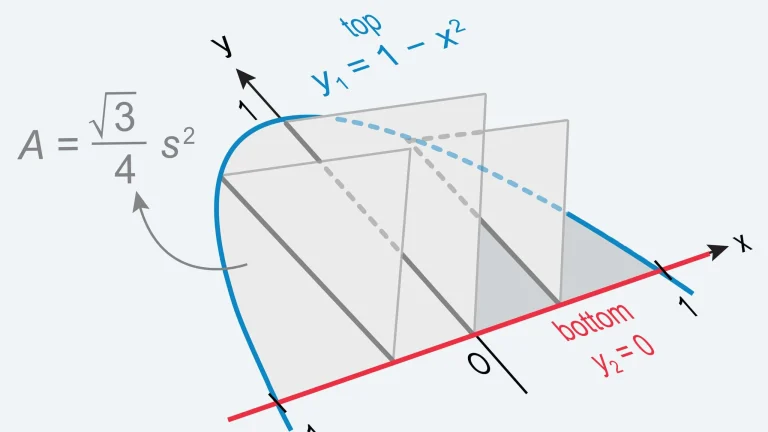If you are taking the AP® Calculus BC exam soon and are curious about its scoring pattern, this article will guide you through the nitty-gritty of the AP Calculus BC scoring system. Let’s explore!
How Is the AP Calculus BC Exam Scored?
The AP Calculus BC exam consists of 2 sections, each contributing 50% to the total composite score. Section I is the multiple-choice section (MCQ), while Section II is the free-response section (FRQ). The AP Calculus BC exam is scored out of 108 points, with each section carrying 54 points. Below is the scoring format for the exam:
| Section I | 45 Multiple-choice Questions | 54 points |
| Section II | 6 Free-Response Questions | 54 points |
| Subtotal | 108 points | |
As you can see, the 54 points in Section I are distributed across 45 multiple-choice questions, making each MCQ carry 1.2 points. Importantly, there is no penalty for incorrect answers in the MCQ section, so guessing does not negatively impact your score.
Explore our AP Calculus BC Practice Questions to prepare effectively for the MCQ and FRQ sections. These include exam-level questions and detailed explanations to sharpen your skills.
Section II, however, follows the ‘step-marking’ method. You earn points for each critical step you approach correctly, even if you don’t reach the correct final answer. Each question is worth 9 points, for a total of 54 points across six questions. These 9 points are distributed into two aspects: first, following the proper steps to solve the problem, and second, determining the correct final answer.
Your total points from each section are added to give you a composite score, which is then converted to an AP score on a scale of 1 to 5. The College Board® does not publish your composite score; you will only see your final AP score on the 1–5 scale.
AP Calculus BC Scoring Table
Your AP Calculus BC exam scores are sent to the colleges of your choice after they've been recorded on the AP grading scale. To estimate your scores, you can use our AP Calc BC score calculator for an approximate prediction. To know how to have the College Board send your scores directly to colleges, refer to our AP Exam Scores page.
Each college has its own criteria for admitting students based on AP scores. However, most colleges use a standard formula to convert your AP Calculus BC score to the equivalent college grade. The following score table shows the conversion of AP scores into equivalent college grades for Calculus BC:
| AP Exam Score | College Grade Equivalent | Qualification |
|---|---|---|
| 5 | A+ or A | Extremely well qualified |
| 4 | A-, B+, or B | Very well qualified |
| 3 | B-, C+, or C | Qualified |
| 2 | — | Possibly Qualified |
| 1 | — | No recommendation |
As you can see, colleges do not typically consider scores below 3 to grant college credits, Advanced Placement®, or admissions. Therefore, aiming for an AP score of 3 or higher is advised if you wish to earn college credits and advanced placement. Nevertheless, always check with the colleges about their minimum AP score requirements before you start the application process.
If you're looking for a resource to better understand scoring criteria and boost your preparation, check out our AP Calculus BC Study Guide in print and digital formats.
Recent research on students who score 2 in AP Calculus BC found that they earn significantly higher grades when taking the course in college than students with the same high school GPA!
AP Calculus BC Score Distribution
AP Calculus BC remains a rigorous yet rewarding course for students pursuing math-intensive fields. In 2024, the exam was taken by 148,191 students, a notable increase from 135,458 in 2023. Despite its challenging content, AP Calculus BC consistently boasts one of the highest success rates among all AP courses. In 2024, 80.9% of students scored a 3 or higher, and an impressive 47.7% of test-takers scored 5 — significantly higher than the success rates for AP Calculus AB. To estimate your potential score, try our AP Calculus BC score calculator and gauge your readiness for the exam.
If you're considering the AP Calculus BC exam, understanding the score distribution can help you evaluate overall student performance and set realistic goals for your preparation. Our AP Calculus BC exam guide will assist you in determining whether Calculus BC is the right subject for you.
Here’s the AP Calculus BC score distribution for 2024:
| AP Score | % of Students 2024 | % of Students 2023 | % of Students 2022 | % of Students 2021 |
|---|---|---|---|---|
| 5 | 47.7% | 43.5% | 41.2% | 38.3% |
| 4 | 21.1% | 15.8% | 15.6% | 16.5% |
| 3 | 12.1% | 19% | 20.1% | 20.4% |
| 2 | 13.9% | 15.2% | 16.4% | 18.2% |
| 1 | 5.2% | 6.3% | 6.8% | 6.6% |
| 3 or Higher % | 80.9% | 78.4% | 76.9% | 75.2% |
Although the success rates for the AP Calculus BC exam remain higher than other AP exams like AP Biology, AP Chemistry, or AP Calculus AB, trends over the past few years reveal fluctuations. In 2020, the success rate was a remarkable 81.6%, but it dropped to 75.2% in 2021. However, pass rates improved slightly in subsequent years, with 76.9% in 2022 and 78.4% in 2023. In 2024, the success rate saw another increase, with 80.9% of test-takers earning a score of 3 or higher, showcasing the exam's ongoing challenge and the perseverance of students preparing for it.
Scoring pattern for AP Calculus BC exams
The 2024 AP Calculus BC exam revealed several key performance trends:
Multiple-Choice Section:
- Calculator vs. Non-Calculator Questions: Students performed better on non-calculator questions than those requiring a calculator.
- Challenging Unit: Unit 10: Infinite Sequences and Series posed significant challenges, with only 7% of students answering all related questions correctly.
The 2023 and 2024 AP Calculus BC exams exhibited distinct performance patterns in the FRQs:
2023 Exam Insights:
- FRQ 1: Focused on modeling rates with Riemann sums and the Mean Value Theorem. The mean score was 5.26 out of 9.
- FRQ 2: Addressed parametric equations and particle motion. Approximately 14% of students achieved perfect scores.
- FRQ 6: Centered on power series and convergence. Less than 1% of students earned perfect scores, indicating its complexity.
2024 Exam Insights:
- FRQ 1: Involved modeling rates, Riemann sums, and average value calculations. The mean score was 6.45 out of 9, showing improved performance compared to 2023.
- FRQ 2: Focused on parametric particle motion. Many students achieved high scores, reflecting a strong understanding in this area.
- FRQ 6: Dealt with power series and convergence. It remained the most challenging, with a minimal percentage of perfect scores.
These trends suggest that while students show proficiency in topics like parametric equations and particle motion, areas involving power series and convergence require more focused preparation. Consistent practice and a thorough understanding of these concepts are essential for success in future exams.

AP Calculus BC Minimum Score Requirement for College Credits
Most colleges in the US recognize AP exam scores for credit or advanced placement. A score of 3 or higher can allow you to skip introductory math courses, earn credit, or both, depending on the institution. Some colleges accept a score of 3, while others require a 5. Certain schools grant placement but no credit for your AP score. Knowing your target college's AP score requirements is essential while preparing for the AP Calculus BC exam.
We’ve compiled a list of institutions and their AP score requirements, detailing the courses you can bypass and whether you can earn credit with your AP Calculus BC score.
| Institution | AP Score | AP Recognition | Credit/Placement type | Credits |
|---|---|---|---|---|
| California State University: Los Angeles | 3 or higher | Credit + Placement |
Subject to qualifying conditions | 6 |
| Grinnell College | 3 or higher | Credit | MAT-124 or 131 | 4 semester credits (only on approval by Mathematics Dept.) |
| Harvard University | 5 | Subject to conditions | Subject to other qualifying conditions | 8 |
| Louisiana State University | 3 | Credit + Placement |
MATH 1021, 1550 + MATH 1552 / 1553 |
8 Credit hrs |
| 4 or 5 | MATH 1021, 1022,1550, 1552 + MATH 2057 / 2058 |
15 Credit hrs | ||
| Massachusetts Institute of Technology | 5 | Credit | 18.01 Calculus I | 12 |
| Mississippi State University | 3 | Credit | MA 1713 | 3 Credit hrs |
| 4 or 5 | MA 1713, MA 1723 | 6 Credit hrs | ||
| New York University | 4 | Credit | MATH-UA 121 | 4 |
| 5 | MATH-UA 121, 122 | 8 | ||
| Notre Dame | 5 | Credit + Placement |
MATH 10550, 10560 | 8 Credit hrs |
| Reed College | 4 or 5 | Credit | Placement determined in consultation with faculty members | 1 |
| Stanford University | 4 | Credit + Placement (subject to conditions) |
MATH 19 or 20 | 6 |
| 5 | MATH 19, 20 or 21 | 10 | ||
| Truman State University | 3 | Credit + Placement |
MATH 192 | 4 |
| 4 | MATH 263 and MATH 198 | 10 | ||
| UCLA (School of Letters and Science) | 3 | Credit | Calculus | 8 |
| 4 | 31A / Calculus | 8 | ||
| 5 | 31A and 31B | 8 | ||
| Yale University | 4 | Credit | MATH 115, MATH 116, or MATH 118 | 1 (subject to other qualifying conditions) |
| 5 | MATH 120 or higher-numbered courses. | 2 (subject to other qualifying conditions) |
Frequently Asked Questions
What is a good AP Calculus BC score?
Scoring a 5 on your AP Calculus BC exam is the top score. Typically, scores of 3 or higher will qualify you for placement and college credits.
What is the average AP Calculus BC score?
The global mean score for the May 2024 administration of the AP Calculus BC exam was 3.92 out of 5.
Why are AP Calculus BC scores curved?
The AP Calculus BC scores are curved to ensure standardization and maintain consistency across exams administered across paper and digital media and at various times. This process also helps in ensuring that the AP exam scores translate into equivalent college grades.
When are AP Calculus BC scores released?
AP Calculus BC scores are released in July every year for the exams administered in May of that year.
How do I check my AP Calculus BC score?
You can easily check your AP Calculus BC scores on the College Board website. Visit apscore.org and log in to your College Board account. Fill in the blanks with your AP number and enter your AP number to view your AP scores.
How do I get a 5 on the AP Calculus BC exam?
The key to a 5 on your AP Calculus BC is understanding the concepts and practicing problems regularly. Prepare a study schedule, watch and read lessons about concepts and formulas you find challenging, and then practice solving these problems. Explore UWorld’s AP Calculus BC exam online prep for detailed lessons and custom practice tests to achieve your AP dream!

References
- Past AP Calculus BC Score Distributions. (2024). apcentral.collegeboard.org. Retrieved December 13, 2024, from https://apstudents.collegeboard.org/about-ap-scores/score-distributions/ap-calculus-bc
- AP® Calculus BC Scoring Statistics 2023 Free-Response Questions. (2023). apcentral.collegeboard.org. Retrieved January 24, 2024, from https://apcentral.collegeboard.org/media/pdf/ap23-calculus-bc-scoring-statistics.pdf
- Chief Reader Report on Student Responses: 2023 AP® Calculus AB/BC Free-Response Questions. (2023). apcentral.collegeboard.org. Retrieved December 13, 2024, from https://apcentral.collegeboard.org/media/pdf/ap23-cr-report-calculus.pdf
- Chief Reader Report on Student Responses: 2024 AP® Calculus AB/BC Free-Response Questions. (2024). apcentral.collegeboard.org. Retrieved December 13, 2024, from https://apcentral.collegeboard.org/media/pdf/ap24-cr-report-calculus.pdf
- AP Credit Policy Search. (2024). AP Students. apcentral.collegeboard.org. Retrieved December 13, 2024, from https://apstudents.collegeboard.org/getting-credit-placement/search-policies/course/4
Read More About AP Calculus BC Exam
Do you want to learn more about the format of the AP Calculus BC exam? Visit our page for a detailed breakdown of the format, question types, and other information!
AP Calculus BC Course and Exam DescriptionLooking for a summary of the College Board CED? Check out our easy-to-understand AP Chemistry CED for in-depth info on the exam, units, weightage, and key topics.
How to Study for AP Calculus BCWant to know the tips and tricks to score a 5 on AP Calculus BC? Our guide, written by industry experts, includes a comprehensive study plan that can help you with it.
Best AP Calculus BC Study Guide ComparisonDiscover expert insights into Kaplan, Barron's, Princeton Review, and UWorld. Learn how each resource compares to help you choose the best fit.
Best AP Calculus BC Prep Course ReviewSearching for top AP Calculus BC prep courses? Read this review to compare the best courses and choose the perfect one for your success.
How to Self-Study for AP Calculus BCWant to ace AP Calculus BC on your own? Follow this expert self-study guide with tips, tricks, and tools to prepare effectively for the exam.



